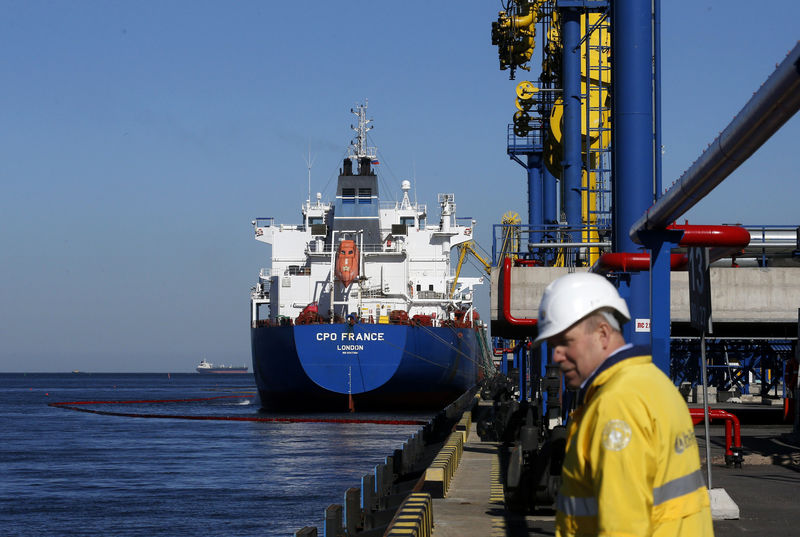By Olga Yagova and Dmitry Zhdannikov
MOSCOW/LONDON (Reuters) - Trading houses Vitol, Glencore (LON:GLEN) and Trafigura are caught in the crossfire between Russian oil producers and Western buyers as the latter refuse to take contaminated crude that traders bought from companies in Russia.
At least 10 crude tankers with 1 million tonnes of oil, worth more than $500 million in normal circumstances, are marooned across Europe and still looking for buyers because they have been contaminated with organic chloride.
The three trading firms bought the cargoes in the Russian Baltic port of Ust-Luga from Russian producers such as Rosneft and Surgut, as well as Kazakh firms.
But buyers including Neste, Eni, Exxon Mobil (NYSE:XOM), Royal Dutch Shell (LON:RDSa), PKN and Repsol (MC:REP) have refused to take the oil into their refining systems, according to at least a dozen traders and Refinitiv shiptracking data. The trading houses declined to comment.
"This is a disaster and a huge blow to Russia's image as a reliable supplier. We hear promises from the Russian government that the problem will be fixed but it still hasn't been fixed," said a buyer of Russian crude, who asked not to be identified because his employer forbids him from speaking to the media.
The contamination was discovered at the end of April, forcing Russia to shut the Druzhba pipeline. The line pumps 1 million barrels per day (bpd) of crude - 1 percent of global supply. Druzhba serves Germany, Poland, the Czech Republic, Slovakia, Hungary, Ukraine and Belarus.
Oil from Ust-Luga, which ships 500,000 bpd to global markets, or 22 large tankers a month, has also been contaminated with organic chloride. The chemical compound is used for oil extraction but can damage refining equipment.
The Russian supply problems contributed to an oil price spike to six-month highs and led to a drop in production from the world's second-largest exporter of crude.
A long outage could force refineries in Europe to cut operations steeply while triggering claims by Western buyers against Russian producers, who could in turn file claims against Russian pipeline monopoly Transneft for lost profit.
A build-up of unsold cargoes from Ust-Luga could create a supply shortage in Europe and further dent the financial results of trading houses, which had a difficult year in 2018 due to a tough business environment.
The Russian government promised to fix the quality problem at Ust-Luga by May 6-8 but five Russian oil buyers said on Wednesday the levels of organic chloride remained too high. At 60-75 parts per million (ppm), they were six times above normal levels, down from 10-15 times above the norm previously.
"I asked my refining manager at what discount he would take such a cargo," a trader with a Western major that declined a cargo from Ust-Luga said.
"Can we make a profit if we buy it at a huge discount? My refining manager told me - don't touch it. Why bother? The risks to refining equipment are just too big."
FEARS GROW
Crude contamination is not rare and has happened in recent years in the United States, Mexico and the Middle East. But the scale of Russia's problem is unusually large.
For Ust-Luga cargoes, fixing the problem is not impossible. But it won't be easy.
Contaminated crude needs to be blended with clean oil to reach necessary standards, but this requires time and significant storage space. It's also costly.
Terminals in Europe's biggest storage area, Amsterdam-Rotterdam-Antwerp, have told customers they will not accept any crude with organic chloride above 50 ppm, three trading sources said.
Neither the Russian government nor Transneft would say whether Russian oil producers might receive compensation, which in turn could be provided to Western buyers.
No help towards diluting contaminated oil has been offered by Moscow or Transneft.
On Wednesday, a spokesman for Russian President Vladimir Putin, Dmitry Peskov, declined to answer a question on whether Transneft should compensate Russian producers.
Russian officials have said contaminated oil from the Druzhba pipeline could be taken by rail towards the Black Sea port of Novorossiisk, where Transneft has large storage tanks.

"We are now performing mandatory quality checks from every single Russia port to avoid a repeat of the Ust-Luga disaster," a second trader with a Western major said.